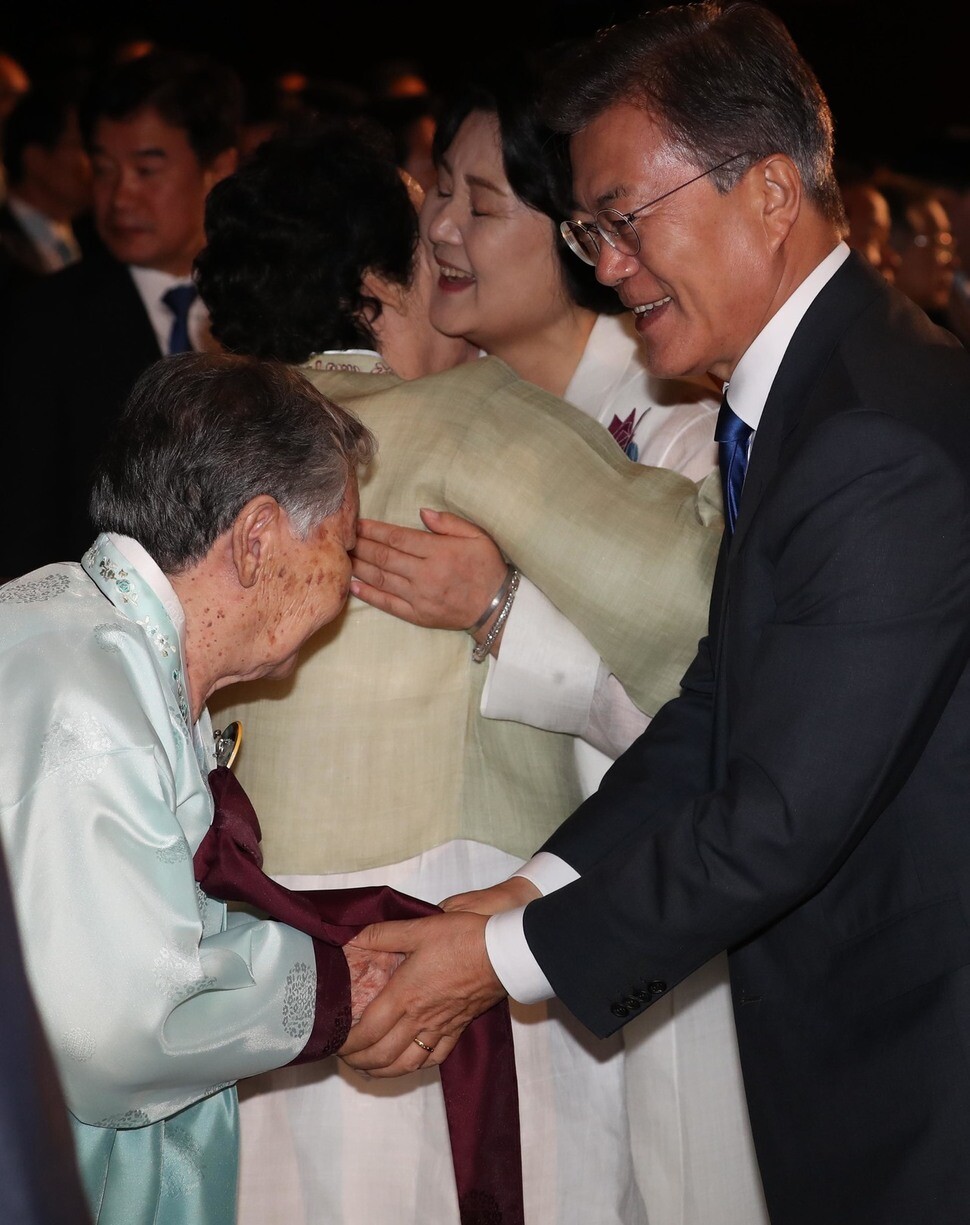hankyoreh
Links to other country sites 다른 나라 사이트 링크
President calls for two-track approach in South Korea-Japan relations

During his Liberation Day address on Aug. 15, South Korean President Moon Jae-in said that South Korea-Japan relations would not be held up by historical issues, but that those issues should not be ignored, either. This reiterates a “two-track” approach that deals with South Korea and Japan’s historical disputes separately from other policies. At the same time, Moon declared he would apply “the principles of the international community” when dealing with victims of the two countries’ historical conflicts. Curiously, however, Moon’s address did not ask Japan to take “legal responsibility” or make an “official apology,” demands that the former comfort women for the Japanese army have made and that Moon himself has previously mentioned.
While Moon’s address emphasized the need to develop South Korea and Japan’s relationship into one that is cooperative and future-oriented, he also devoted considerable attention to historical issues. “It’s not desirable for issues of the past and historical issues to continue to hold back the future-oriented development of South Korea-Japan relations,” Moon said, while also emphasizing that “just because we value the future of South Korea-Japan relations doesn’t mean we can disregard historical issues.”
“Bringing about a proper conclusion to historical issues will only deepen trust between our two countries. The obstacle to South Korea-Japan relations is not historical issues per se, but rather the Japanese government’s shifting attitude toward dealing with those issues,” Moon said. Moon’s assessment of the efforts of Japanese politician and intellectuals is also thought to be a jab at the administration of Japanese Prime Minister Shinzo Abe. “In the context of President Moon’s address, he seems to be saying that we will cooperate with Japan where appropriate and take issue when necessary. That’s promising, if he puts it into practice,” said Cho Se-yeong, director of the Institute for Japan Studies at Dongseo University.
Moon laid out a vision of development for South Korea-Japan relations as he mentioned the need for a joint response to the threat posed by North Korea’s nuclear weapons and missiles. He also called for shuttle diplomacy, by which the leaders of the two countries would make reciprocal visits to share their opinions on the latest urgent matters.
It’s also notable that Moon mentioned a victim-centered approach to resolving the historical issues weighing on South Korea-Japan relations. “The international community has principles for solving historical issues affecting South Korea and Japan such as the comfort women and people drafted for forced labor, and these principles include compensating the victims and restoring [the integrity of] their reputations, conducting a full investigation and promising to prevent such things from reoccurring, in line with universal human values and national consent. The South Korean government will abide by these principles,” Moon said, adding that “Japan’s leaders need to boldly change their position.” Thus, the government’s approach to the issue of the victims of South Korea and Japan’s historical conflicts is based not on bilateral relations but on “the principles of the international community.”
Moon did not specifically ask the Japanese government to take “legal responsibility” or to make an official apology for the comfort women. This represents something of a departure from the stance he took during an interview with the Washington Post on June 21 in which he said that Japan must acknowledge its legal responsibility for the comfort women and make an official governmental apology, prompting questions about Seoul’s actions in the future.
By Kim Ji-eun, staff reporter
Please direct questions or comments to [english@hani.co.kr]

Editorial・opinion
![[Column] Park Geun-hye déjà vu in Yoon Suk-yeol [Column] Park Geun-hye déjà vu in Yoon Suk-yeol](https://flexible.img.hani.co.kr/flexible/normal/500/300/imgdb/original/2024/0424/651713945113788.jpg) [Column] Park Geun-hye déjà vu in Yoon Suk-yeol
[Column] Park Geun-hye déjà vu in Yoon Suk-yeol![[Editorial] New weight of N. Korea’s nuclear threats makes dialogue all the more urgent [Editorial] New weight of N. Korea’s nuclear threats makes dialogue all the more urgent](https://flexible.img.hani.co.kr/flexible/normal/500/300/imgdb/original/2024/0424/7317139454662664.jpg) [Editorial] New weight of N. Korea’s nuclear threats makes dialogue all the more urgent
[Editorial] New weight of N. Korea’s nuclear threats makes dialogue all the more urgent- [Guest essay] The real reason Korea’s new right wants to dub Rhee a founding father
- [Column] ‘Choson’: Is it time we start referring to N. Korea in its own terms?
- [Editorial] Japan’s rewriting of history with Korea has gone too far
- [Column] The president’s questionable capacity for dialogue
- [Column] Are chaebol firms just pizza pies for families to divvy up as they please?
- [Column] Has Korea, too, crossed the Rubicon on China?
- [Correspondent’s column] In Japan’s alliance with US, echoes of its past alliances with UK
- [Editorial] Does Yoon think the Korean public is wrong?
Most viewed articles
- 1‘We must say no’: Seoul defense chief on Korean, USFK involvement in hypothetical Taiwan crisis
- 2N. Korean delegation’s trip to Iran shows how Pyongyang is leveraging ties with Moscow
- 3‘Weddingflation’ breaks the bank for Korean couples-to-be
- 4Will NewJeans end up collateral damage in internal feud at K-pop juggernaut Hybe?
- 546% of cases of violence against women in Korea perpetrated by intimate partner, study finds
- 6[Column] Park Geun-hye déjà vu in Yoon Suk-yeol
- 7“Parental care contracts” increasingly common in South Korea
- 8[Column] Yoon’s first 100 days should open our eyes to pitfalls of presidential system
- 9[Interview] Dear Korean men, It’s OK to admit you’re not always strong
- 10[Editorial] New weight of N. Korea’s nuclear threats makes dialogue all the more urgent